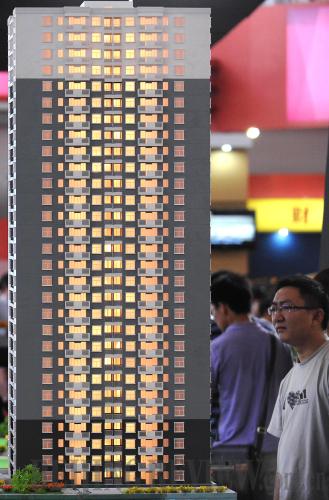|
 |
|
DREAM HOME: A prospective home buyer looks at a model of a property project at the property trade fair in Kunming (LIN YIGUANG) |
The Central Government stated any local governments failing to enforce or being reluctant to implement the above-mentioned regulations will be held responsible for ignoring the new regulations.
Immediate effect
According to figures from Bjfdc.gov.cn, a property data website hosted by the Beijing Municipal Commission for Housing and Urban-Rural Development, the Beijing property market cooled, if only slightly, in October compared with September. The transaction volume of newly built commercial properties dropped to 2,060 in October from 3,219 in September, down 36 percent month on month. The number of second-hand homes sold in the first 10 days of October stood at 1,948, down 63.4 percent from the same period of September.
Yin Zhongli, a finance researcher at the Chinese Academy of Social Sciences, said the decreases are due to the new policies taking effect.
Traditionally, government controls have lagged behind market changes, but the timely and effective new measures adopted on September 29 indicate that decision-makers and regulatory departments have grasped the latest market movement. It also showed their determination to contain the rampant price surges in the property market.
For the past few months, prospective house buyers have been waiting for the government's measures to take hold. Lin Lei, market supervisor of the IFM Investments Ltd., expected the wait-and-see period to last for another six months. But she told consumers not to expect a big slump in housing prices as deep-pocketed developers have capital reserves and are unlikely to cut prices anytime soon. "But the trend is irreversible. The drop in trade volume is usually followed by price decreases," Lin said.
No market collapse
Xie Guozhong said the recent government measures have indeed controlled the size of the bubble, and thus prevented a possible bubble burst. "The property bubble has stopped expanding and the air will have to gradually be let out," said Xie.
The negative impact of the property market fallback will be much smaller than some analysts expected, Xie said. Some interest groups have spread rumors that the collapse of the real estate market will lead to the collapse of the economy. Indeed, a retreating real estate market will inevitably lead to an economic slowdown, but the rapid growth in consumption, exports and infrastructure will be able to prop up the Chinese economy should such a financial disaster happen.
Tightened liquidity
But what real estate developer fear most, Xie said, is tightened liquidity—especially since the Chinese Government is taking a step-by-step approach to absorbing excess liquidity and tightening monetary policies to prevent inflation. The central bank is restricting bank credit and has raised the reserve requirement ratio several times this year. In the meantime, the inflow of hot money into China has been stifled.
As long as the Chinese currency does not appreciate to a large extent, Xie said, the liquidity will become smaller. If the renminbi appreciates substantially, the market will depreciate, ultimately leading to the collapse of China's property market. "I don't think China will allow its currency to appreciate by a wide margin, so a property market collapse is unlikely," said Xie.
The National Real Estate Market In the Past Three Quarters
In the past three quarters, investment in real estate development totaled 3351.1 billion yuan ($504.2 billion), up by 36.4 percent year on year, of which, investment in residential buildings reached 2.35 trillion yuan ($353.7 billion), representing a 33.8-percent increase year on year and accounting for 70.2 percent of the investment in real estate development.
Newly built housing floor space stood at 1.19 billion square meters, up 63.1 percent year-on-year; and completed floor space reached 369 million square meters, climbing 10.4 percent year on year.
Floor space of commercial buildings sold surged 8.2 percent year on year to 632 million square meters.
Real estate development enterprise funds reached 5.05 trillion yuan ($759.8 billion), a year-on-year increase of 32.5 percent. Of the total, domestic loans amounted to 939.8 billion yuan ($141.4 billion), up 27.2 percent; utilization of foreign funds reached 45.2 billion yuan ($6.8 billion), increasing 26 percent; self-financing funds hit 1.91 trillion yuan ($287.7 billion), up 49.7 percent; and funds from other sources totalled 2.15 trillion yuan ($323.9 billion), rising 22.3 percent. Of the funds from other sources, deposits and advantage payments totaled 1.22 trillion yuan ($183.3 billion), increasing 18.7 percent; and personal mortgage loans stood at 639.1 billion yuan ($96.2 billion), increasing 19.6 percent.
(Source: National Bureau of Statistics)
| 